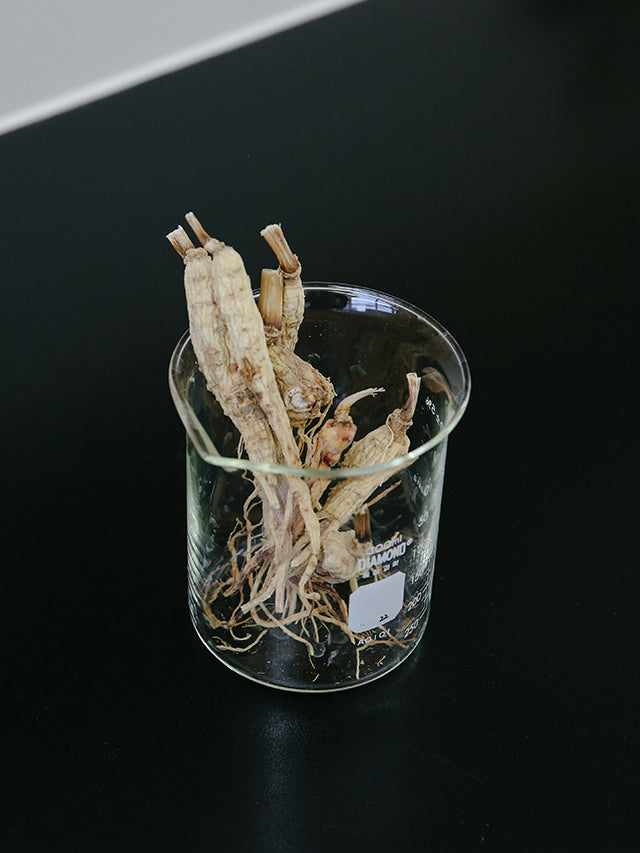with9
Gultinosa
Cordata
Multiflorus
Orientalis L
APOTHEHAIR® Hair Remedy
Through the infusion of 9 of the finest South Korean traditional and medicinal Ingredients found in Geumsan, South Korea /Scapes/ has created its own formula, APOTHEHAIR Remedy.
These premium ingredients include Rehmannia Gultinosa, Camomile, Peony, Green Tea, Mugwort, Morus Bark, Houttuynia Cordata, Pleuropterus Multiflorus, Thuja Orientalis L.
-
Korean Ginseng
Ginseng from Geumsan, Korea promotes hair growth and reduces hair loss. Studies show that ginseng reduces stress when its properties are absorbed, and reduced stress can help prevent or slow hair loss.
-
Camellia Oil
Camellia Oil from Juju Island has been used popularly for damaged hair care since the Chosun Era, from 1392 to 1897, Korea. Camellia oil is rich in omega 9 fatty acids. It is able to seal in moisture, restores the color of grey hair, and provides nutrition to distressed and damaged hair.
-
Cactus Flower
Cactus Flower from Jeju Island, Korea is known for its ability to prevent wrinkles and adding firmness and elasticity to the skin. It also helps in retaining natural moisture.
-
Rice Water
Rice water is one of the beauty secrets of Korean Women. It contains nutrients that can renew skin and brightens skin tone with its Vitamin B.
-
Calamus Sap
The benefits of Calamus sap has been known since ancient times across the globe and also Korea. By strengthening the hair follicle, it prevents hair loss and rejuvenates the skin.
without8
Testing
Additives
No Synthetic Colors added
The colors of products are the pure and natural colors achieved during the herbal extraction decocting process without any artificial colors added. By minimizing chemical ingredients, they have produced the highest quality product for its consumer.
-
No Color Additives
The colors of products are the pure and natural colors achieved during the herbal extraction decocting process without any artificial colors added. By minimizing chemical ingredients, they have produced the highest quality product for its consumer.
-
Mineral Oil
Mineral oil is any of various colorless, odorless, light mixtures of higher alkanes from a mineral source, particularly a distillate of petroleum. The name mineral oil by itself is imprecise, having been used for many specific oils over the past few centuries. Other names, similarly imprecise, include white oil, paraffin oil, liquid paraffin (a highly refined medical grade), paraffinum liquidum (Latin), and liquid petroleum.
-
Paraben
Parabens are the most widely used preservative in cosmetics. They are also used as fragrance ingredients, but consumers won’t find that listed on the label. Fragrance recipes are considered trade secrets, so manufacturers are not required to disclose fragrance chemicals in the list of ingredients (see also Fragrance/Parfum). An estimated 75 to 90 per cent of cosmetics contain parabens (typically at very low levels).
-
SLS
Sodium laureth sulfate (sometimes referred to as SLES) is used in cosmetics as a detergent and also to make products bubble and foam. It is common in shampoos, shower gels and facial cleansers. It is also found in household cleaning products, like dish soap.
-
Tricolsan
Triclosan is an antibacterial agent and preservative used in personal care and home-cleaning products; persistent in the environment and may be associated with endocrine (hormonal) toxicity.
-
Silicone
Silicones, also known as polysiloxanes, are polymers that include any synthetic compound made up of repeating units of siloxane, which is a chain of alternating silicon atoms and oxygen atoms, combined with carbon, hydrogen, and sometimes other elements.
-
Animal Testing
We estimate that approximately 100,000-200,000 animals suffer and die just for cosmetics every year around the world. These are rabbits, guinea pigs, hamsters, rats and mice. While dogs and monkeys are never used to test cosmetics anywhere in the world, they are used to test other types of chemicals.
-
Phthalates
Dibutyl phthalate (pronounced thal-ate), or DBP, is used mainly in nail products as a solvent for dyes and as a plasticizer that prevents nail polishes from becoming brittle. Phthalates are also used as fragrance ingredients in many other cosmetics, but consumers won’t find these listed on the label. Fragrance recipes are considered trade secrets, so manufacturers are not required to disclose fragrance chemicals in the list of ingredients (see also Fragrance/Parfum). DBP is also commonly used in polyvinyl chloride plastic (PVC) to render it flexible.

Manufacturer
The Manufacturer and its Central Research Center were founded in 1995. They were the first in Korea to receive patents on hair loss prevention and hair growth shampoos through using herbal ingredients.-
Central Laboratory
The Central Research Center collected herbal ingredients fitting product features and conducted base separation tests according to texture, low irritation, and temperature. Through intense through study and market research of the tastes and trends of the consumer, they have produced their products to be one of the best in hair care in all aspects.
-
Decocting Process
Similar to steeping the manufacturer uses the decocting process which uses boiling water over long durations to extract the highest volume of fermented natural herb concentration. During this process, the natural herbs are boiled slowly in a specified volume of water for exact durations of time in order to extract the purest amount of herbal concentrates from these premium medicinal herbs.
-
No Synthetic Colors added
The colors of products are the pure and natural colors achieved during the herbal extraction decocting process without any artificial colors added. By minimizing chemical ingredients, they have produced the highest quality product for its consumer.
-
Representative Awards
With their intense work ethics and product efficacy, the manufacturer has been selected ad "Grand Prize for Brand of the Year" for eight consecutive years (2016, 2015, 2014, 2013, 2012, 2011, 2010, 2009).
With its trademark recipe and extraction methods, the manufacturer was also awarded Master Brand for Hair Loss Prevention Shampoo for 7 consecutive years (2016m 2015, 2014, 2013, 2012, 2011, 2010).
